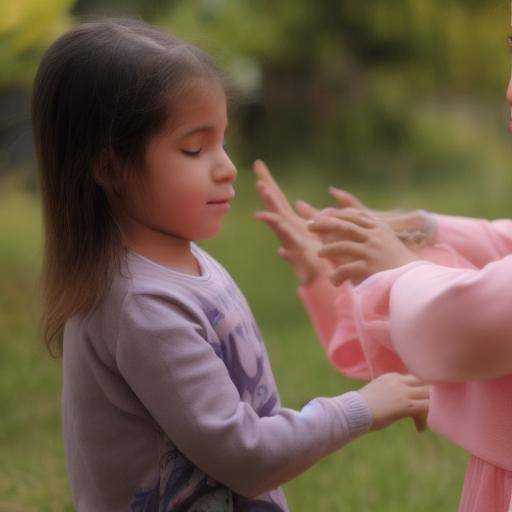
Introduction
Teaching children to practice gratitude is essential for their emotional well-being and personal development. The ability to appreciate the positive in their lives not only helps them build stronger and healthy relationships, but also fosters a positive attitude and resilience to the challenges. In this article, we will explore effective strategies to inculcate gratitude in children, as well as their relationship with child welfare and emotional development.
History and Background
The practice of gratitude has deep roots in different cultures and traditions. From ancient philosophy to religious teachings, gratitude has been regarded as an essential virtue for a full life. Numerous benefits associated with gratitude have been observed, including greater satisfaction with life, better mental and emotional health, and greater resilience to stress.
Throughout history, prominent figures have praised gratitude as a fundamental pillar of human well-being. From philosophers and thinkers to religious leaders, the importance of recognizing and assessing what has been widely recognized. The evolution of positive psychology has also contributed to highlighting the crucial role of gratitude in people's mental and emotional health.
Analysis in Deep
By analyzing gratitude in the context of children, their significant impact on their emotional well-being is revealed. Current research has shown that regular practice of gratitude can increase happiness, promote a more positive attitude and improve the interpersonal relationships of children. This approach also helps them develop empathy, compassion, and resilience.
It is important to recognize that while gratitude offers a number of benefits, it can also present challenges in its implementation in the child environment. Children can face difficulties in understanding and interiorizing the concept of gratitude, and it is crucial to address these barriers effectively. In doing so, you can ensure that the practice of gratitude is authentic and meaningful to children.
Comprehensive review
In reviewing the practical application of gratitude to children, it is essential to consider various strategies and approaches to effectively cultivate this quality. From the modeling of adult gratified behaviors to the incorporation of activities and routines that encourage reflection and appreciation, there are many ways to promote gratitude in the child environment.
Consultation with experts in child psychology and education can provide valuable insights into best practices to teach gratitude to children. By using evidence-based approaches adapted to the individual needs of children, the positive impact of gratitude on their emotional well-being and personal development can be maximized.
Comparative analysis
By comparing gratitude to children with child well-being and emotional development, intrinsic connections between these fundamental aspects of child growth and development are revealed. Gratitude not only contributes directly to the emotional well-being of children, but also influences their ability to manage stress, regulate their emotions and foster positive relationships.
It is important to note that while gratitude, child welfare and emotional development are closely related, each represents a unique and significant aspect of the growth and well-being of children. In understanding the interconnections between these aspects, parents, educators and health professionals can adopt holistic approaches to support the integral well-being of children.
Practical Tips and Accessible Tips
To foster gratitude in children, it is crucial to implement practical and effective strategies that align with their needs and capacities. Some tips include the promotion of verbal expressions of gratitude, the creation of rituals of gratitude, such as keeping a daily of gratitude, and the promotion of reflection on blessings in your daily life. These simple yet powerful practices can help cultivate a deep sense of gratitude in children, strengthening their emotional well-being and resilience.
Conclusions
Teaching children to practice gratitude is an invaluable investment in their emotional well-being and personal development. Gratitude not only helps them cultivate positive attitudes and healthy relationships, but also promotes resilience and happiness throughout their lives. By adopting effective strategies and fostering an environment that values gratitude, you can lay the foundation for meaningful emotional and personal growth in children.
Frequently asked questions
1. Why is it important to teach gratitude to children?
Teaching gratitude to children is fundamental, as it helps them to develop a positive attitude, promotes empathy, strengthens interpersonal relationships and fosters emotional resilience.
2. How can I teach gratitude to a small child?
You can teach gratitude to a young child by modeling grateful behaviors, using the game to encourage reflection on blessings and verbally expressing your own gratitude in your presence.
3. What are some practical activities to promote gratitude to children?
Some practical activities include maintaining a daily of gratitude, creating a "tree of gratitude" where children can hang notes of gratitude, and fostering the verbal expression of gratitude in everyday life.
4. What role do parents and caregivers play in teaching gratitude to children?
Parents and caregivers play a key role in modeling grateful behaviors, fostering verbal expressions of gratitude and providing an environment that values appreciation and recognition.
5. Is gratitude to children related to their emotional well-being?
Yes, gratitude in children is closely related to their emotional well-being, promoting happiness, healthy relationships and emotional resilience.
6. How can I help a child practice gratitude if he faces challenges or adversities?
In challenging situations, it is essential to validate the feelings of the child and at the same time encourage reflection on the blessings present, promoting a perspective of gratitude even in difficult times.
In short, teaching children to practice gratitude is an invaluable gift that provides them with the tools necessary to cultivate a positive and resilient mentality, as well as meaningful relationships in their lives. By implementing practical strategies and fostering an environment that values gratitude, children can embark on a journey to lasting emotional well-being.
